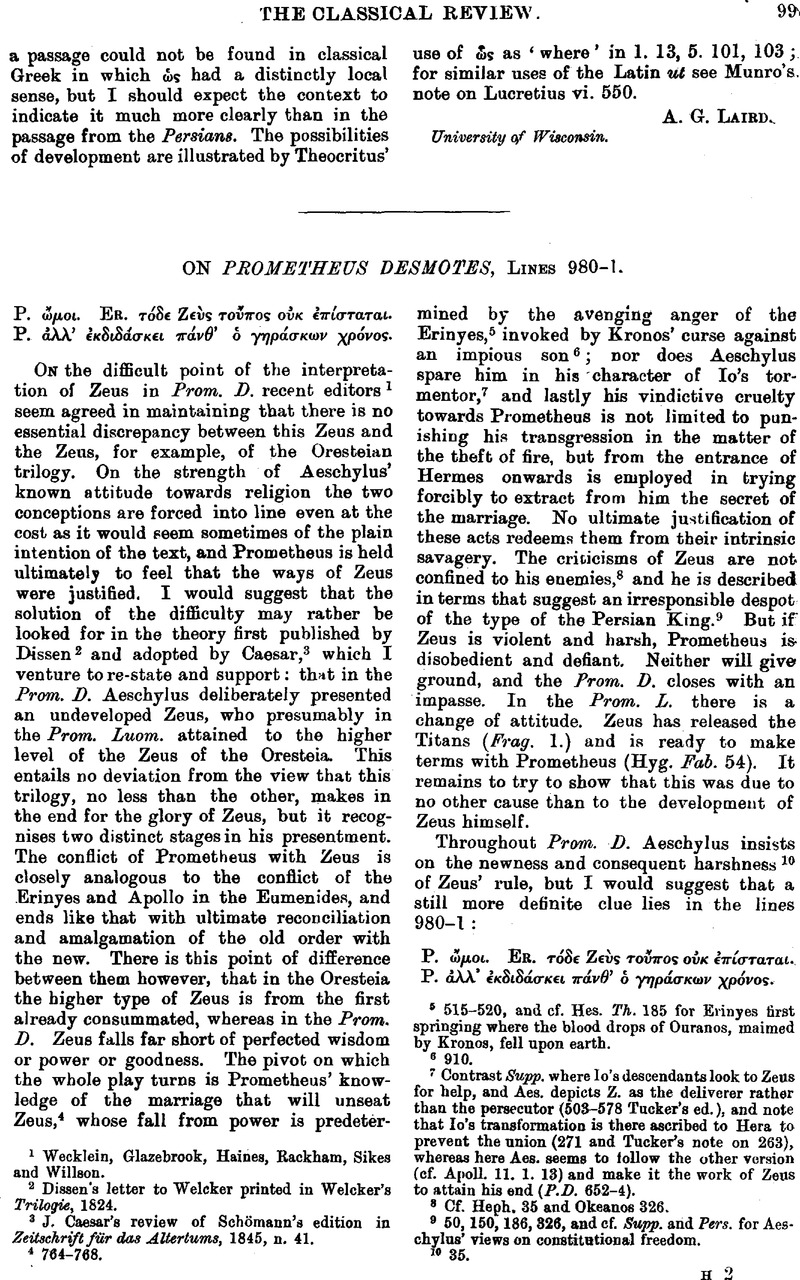Article contents
On Prometheus Desmotes, Lines 980–1
Published online by Cambridge University Press: 27 October 2009
Abstract

- Type
- Original Contributions
- Information
- Copyright
- Copyright © The Classical Association 1904
References
page 99 note 1 Wecklein, Glazebrook, Haines, Backham, Sikes and Willson.
page 99 note 2 Dissen's letter to Weleker printed in Welcker's Trilogie, 1824.
page 99 note 3 Caesar's, J. review of Schömann's edition in Zeitschrift für das Altertums, 1845, n. 41Google Scholar.
page 99 note 4 764–768.
page 99 note 5 515–520, and cf. Hes. Th. 185 for Erinyes first springing where the blood drops of Ouranos, maimed by Eronos, fell upon earth.
page 99 note 6 910.
page 99 note 7 Contrast Supp. where Io's descendants look to Zeus for help, and Aes. depicts Z. as the deliverer rather than the persecutor (508–578 Tucker's ed.), and note that Io's transformation is there ascribed to Hera to prevent the union (271 and Tucker's note on 263), whereas here Aes. seems to follow the other version (cf. Apoll. 11. 1. 13) and make it the work of Zens to attain his end (P.D. 652–4).
page 99 note 8 Cf. Heph. 35 and Okeanos 326.
page 99 note 9 50, 150, 186, 326, and cf. Supp. and Pers. for Aeschylus' views on constitutional freedom.
page 99 note 10 35.
page 100 note 1 Aes. Ag. 177 π⋯θει μ⋯θος.
page 100 note 2 221.
page 100 note 3 Eum. 2 and Dr. Verrall's Eur. the Rationalist, p. 222.
page 100 note 4 Preller-Robert I2, p. 475.
page 100 note 5 874, etc.
page 100 note 6 105. 514.
page 100 note 7 764–768.
page 100 note 8 P.'s forcknowledge is imperfect, cf. 267, 511 (οὔπω), and he can be blinded by passion: for he evidently looks to the time when Zeus will be willing to purchase the secret by his release, 170, 770, and 192, 260, 373, 525, are not inconsistent with this: but at 756 he treats Z. 's fall as assured and his own release as resulting from it, cf. 909, though at 990 he reverts to the notion of a bargain. In P.L. the bargain is made, but (according to Hyg. Fab. 54) the terms are reversed, i.e. P. tells the secret and is then released.
page 100 note 9 cf. Eum. 641–646.
page 100 note 10 194.
page 100 note 11 Cf. Keek's, review of Welcker's ‘Griechische Götterlehre,’ Jahrb. für Phil. und Pacd. 1860Google Scholar.
- 1
- Cited by


